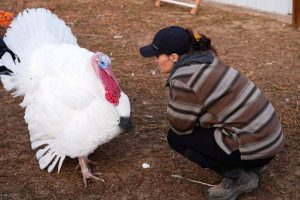DETROIT
By ED WHITEAssociated Press
A young Chinese scientist who’s been in jail for three months will be returning to China. A judge in Detroit says no additional jail time is necessary for Chengxuan Han. She pleaded no contest to illegally shipping biological material to the U.S. before arriving for a job at the University of Michigan. The material wasn’t hazardous, but the government says the packages were not properly labeled and that Han didn’t have approval to ship them. Han says it’s been a “very painful” lesson and that her career is “destroyed.”
DETROIT (AP) — A young Chinese scientist interrogated for hours after an international flight to Detroit and held in jail for three months was sentenced to time served Wednesday for illegally shipping biological material to the U.S. that nonetheless wasn't a threat to the public.
U.S. District Judge Matthew Leitman acknowledged that federal agents have a critical role in stopping “bad actors” from trying to get “bad stuff” into the country. But he also noted that Chengxuan Han, who was headed to a one-year job at a University of Michigan lab, doesn't appear to fit that category.
“That’s the appropriate balance to strike here,” the judge said in declining to keep Han locked up for another three months as the government had suggested.
Han cried as she spoke to the judge in Mandarin and expressed regret for a “very painful” lesson. She said her career will be “destroyed” when she soon returns to China.
“Government agents are doing their duties here. … I really have no intention to harm anybody and create a security hazard,” Han said through a translator.
The U.S. Attorney's Office in Detroit has used unflattering language in promoting the case against Han, even referring to her as an “alien from Wuhan,” a Chinese city that became notorious as the possible source for the global spread of COVID-19.
Han is “not some sort of Chinese operative,” defense attorney Sara Garber said in a court filing, describing her as a “nerdy, kind and polite academic.”
Han, who is in her late 20s, pleaded no contest to smuggling and making false statements. Before her arrival in the U.S., authorities said she made three shipments to someone in Ann Arbor, Michigan, including a book with a hidden envelope that contained filter paper with 28 shapes containing plasmids, which are found naturally in bacteria.
“Hello! This is a fun letter with interesting patterns. I hope you can enjoy the pleasure within it,” Han wrote.
Han was also accused of sending petri dishes that contained nematode worms, known as C. Elegans. Authorities said the packages were not properly labeled and that Han didn't have approval to ship them.
“C. Elegans is easy to obtain, easy to study, nonharmful,” Garber said.
She said Han's research focuses on how organisms detect light, touch and temperature.
“This is not a case of smuggling in some sort of virus or a crop-destroying something or other,” the judge said. “From what I can tell, this material was not a threat at all."
Han's case is one of two involving Chinese scientists and the University of Michigan. Yunqing Jian is charged with conspiring with her boyfriend, another scientist from China, to bring a toxic fungus into the U.S. Fusarium graminearum can attack wheat, barley, maize and rice.
It is already found in the East and Upper Midwest, and scientists have been studying it for decades. Jian's case is pending.





